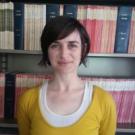Faith Wilson Stein

Faith Wilson Stein is Associate Editor at Stanford University Press.
When did you first develop an interest in Slavic, East European and Eurasian studies?
With hindsight, of course, my path to Slavic studies looks obvious, if not inevitable. Years before taking Liza Knapp’s seminar on Tolstoy, Dostoevsky, and the British novel as an undergraduate at Cal, before arguing about Gogol’s “The Overcoat” in a high school English class, or being staggered by Chekhov’s “The Bet” as a freshman before that, I was shown the cyrillic alphabet by some older students visiting my elementary school classroom and found myself flummoxed and delighted by the incongruities between its letters and what I had thus far thought language to be. Those preceding encounters were largely forgotten until much later, the inherent logic of Russian literature’s appeal seeming so obvious as to need no explanation. Of course I wanted to read it, and read it in conversation with the other big books of nineteenth-century Europe. What else would I have read? (“Brecht,” my grandmother said. But she forgave me eventually.) That seminar with Professor Knapp did seem, at the time, to be the deciding factor, however. She modeled the kind of uninhibited enthusiasm with which one could approach reading, teaching, and discussing literature; the novels posed with complete seriousness the kinds of unwieldy, unsettling, and un-ignorable questions to which we’re invited not to have answers.
Tell us about your career trajectory that led you to your current profession.
In terms of career trajectory, then, I’d certainly thought I would take—or at least attempt—-the typical academic route, in no small part because alternatives weren’t apparent. What job might one have with a doctorate in comparative literature other than professor? Glib jokes about serving coffee aside, the possibilities are constrained only by one’s imagination and aptitude for seeking out other options, as well as the visibility of those options and the availability of mentors whose own store of advice is similarly unencumbered by preconceived ideas. Nobody wants to disappoint their role models, and having felt the full support of many of mine as I veered off the usual track was invaluable. My working now in publishing wasn’t initially a clear goal. I was completing my degree, at the University of Illinois at Urbana-Champaign, increasingly sure both that I wouldn’t be successful on the job market and that not getting a teaching position would in fact be a relief, as terrifying as it was not to know what came next. I’d been an editorial assistant at Slavic Review, relishing the work and the opportunity to learn from Jane Hedges and Mark Steinberg. When Jane announced her retirement, the idea of filling her shoes was terrifying, which made clear that I needed to try it. And getting to work under the incoming editor, Harriet Murav, whose responses to my own research and writing invariably prompted me to set the bar higher for myself, was an obvious boon. In the few years I served as managing editor of the journal, I was inordinately lucky to have worked with scholars writing in myriad areas of study, the regional, temporal, and disciplinary breadth making every issue an opportunity both to learn and to be made painfully aware of how much one has left to learn. Coming up against the limits of my knowledge while being able to use the skills I did possess in service to the dissemination of information and ideas was and remains a privilege, and it served me well in preparing for my current position. The manuscripts in literary studies, philosophy, and religion which I am now working on cover a wider array of subjects than I could master in a lifetime of reading—a thought that may be a fitting coda to my initial fascination with that Chekhov story—but the experience and training I received and continue to build on comprises the same basic elements: read actively, not passively; write in the margins; read it again; be imopeccable in your organizational system, flexible in your use of it, and wary of confidence in its ability to obviate the need for double-checking.
What advice do you have for those interested in a similar career?
In speaking with others who have used their degrees in alt- or non- or para-academic careers, the common lesson would seem to be that one must stay open—not just open minded in general, but also open to exploring the unanticipated and unfamiliar, to make oneself an amateur again, and with enthusiasm, in any number of roles. Seek out those opportunities, especially early on, if for no other reason than to expand one’s breadth of professional as well as personal experiences and perhaps come back to the original goal all the more sincerely assured of its being the right one. The same approach could, arguably, be applied to Slavic studies: while the subjects and authors I engaged with in my research were quite traditional—domesticity, “Tolstoevsky”, French and English, the novel—my work, by which I mean both my own scholarship and that of other researchers, needed the influence of non-canonical perspectives. Moreover, I needed to have instilled in me a hearty respect for the that labor has been and continues to be put into making those perspectives visible, to expanding the range of voices to which we are accustomed to paying attention and the variety of sociopolitical issues to which we accord space and time. Knowing isn’t showing; it’s praxis that makes perfect.
